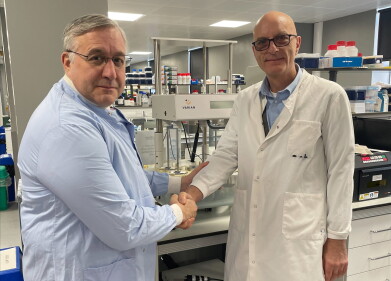News
Partnership to advance understanding of ALS through gene editing platform
Jun 21 2024
The Francis Crick Institute, a world-leading biomedical discovery institute dedicated to understanding the biology underlying health and disease, has partnered with cell and gene therapies developer Broken String Biosciences (Cambridge), to develop novel applications for the company’s proprietary DNA break-mapping platform, INDUCE-seq™, beyond its established capabilities in gene-editing.
The research will be focused on leveraging the technology to investigate the impact of genomic instability in the development of amyotrophic lateral sclerosis (ALS). This progressive and debilitating neurodegenerative disease, causes gradual loss of the ability to control voluntary movements and basic bodily functions.
The collaboration will combine the interests of Professor Simon Boulton and Dr Nishita Parnandi at the Crick focused on genome stability and DNA double-strand break (DSB), with Prof Rickie Patani and Dr Giulia Tyzack interested in understanding the underlying mechanism of ALS disease mechanism.
The INDUCE-seq platform, a development led by Professor Simon Reed at Broken String, will be assessed and further validated for investigations into the ALS mechanism.
The partnership was secured via the Francis Crick Institute’s Business Engagement Fund, a new initiative supported by The Medical Research Council (MRC-UKRI), that is designed to encourage collaborations with small-to-medium sized enterprises (SMEs) and strengthen the Crick’s engagement with industry.
Dr. Simon Boulton, Principal Group Leader, the Boulton Lab (DSB Repair Metabolism) at the Francis Crick Institute, said: “Our research is focused on exploring how cells repair damage to their DNA, and how failures in this process lead to disease. Following exploratory work with Professor Reed, we were keen to collaborate with Broken String. We are excited to leverage the INDUCE-seq platform’s unique capabilities in directly measuring and quantifying DNA double-strand breaks, and applying this to deepen our understanding of diseases that have genomic instability as a contributing factor, such as ALS.”
Felix Dobbs PhD, CEO, Broken String Biosciences, commented: “This collaboration with the Crick Institute is validation of our differentiated approach to DNA break-mapping; enabling our team to support world-leading research with insights provided through our INDUCE-seq platform. It demonstrates a fantastic opportunity to apply our expertise across other key research areas to support the advancement of human health.” He added: “There is an unmet clinical need for effective ALS treatments, as well as strategies for earlier diagnosis that can significantly improve patient outcomes. We look forward to working closely with Dr Boulton and Professor Patani’s groups to support this critical research area and continue building out our application focuses.”
More information online
Digital Edition
ILM 50.2 March 2025
March 2025
Chromatography Articles - Effects of small deviations in flow rate on GPC/SEC results Mass Spectrometry & Spectroscopy Articles - Waiting for the present to catch up to the future: A bette...
View all digital editions
Events
Mar 17 2025 Milan, Italy
Mar 18 2025 Beijing, China
Mar 20 2025 Brussels, Belgium
Mar 20 2025 Chandigarh, India
ACS National Meeting & Expo, Spring 2025
Mar 23 2025 San Diego, CA, USA
.jpg)


















